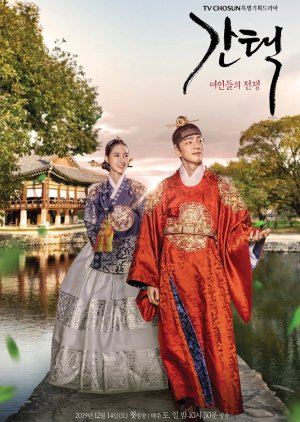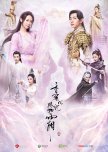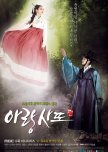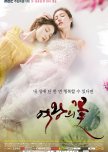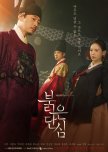
First parallel is the setting, both are set in the Joseon era. Next is the very political plot, with many plot twists and love rivalry. Yet, the main leads try to find how they could be able to love each other despite their obstacles.
WARNING: Next paragraph may contain spoiler
Another parallel though is that the main girl enters the palace as the male lead's concubine.
WARNING: Next paragraph may contain spoiler
Another parallel though is that the main girl enters the palace as the male lead's concubine.

Same young female lead, she plays as twins in both dramas, except in the King's Affection, she plays a twin pair of a girl and a boy. Something happens to one of the twins in both dramas.
Again, Joseon Era setting, and political plots.
There is also a parallel of the main leads meeting at a young age, and starting to have feelings for each other since then.
Again, Joseon Era setting, and political plots.
There is also a parallel of the main leads meeting at a young age, and starting to have feelings for each other since then.

Both dramas are sort of a gender flipped variation of each other with the same concepts: a FL who was supposed to have been killed at birth because she was born a twin but survives, twins who get mistaken for each other, one ends up murdered and the other stepping into their place, mistaken/unknown identities, assassination attempts and scheming within the palace, a childhood meeting between the main couple that the ML or both never forget even as an adult, and a happy ending outside of the palace.

BH is basically a darker version of QLAW, both about a childhood meeting between the prince and a noble girl, his determination to select her as his queen, and the palace scheming, intrigue, and assassinations that result in the FL losing her family and living a commoner's life before eventually ending up as the queen. The love/hate relationship between the main couple is similar, as is the FL's personality.

Both are historic dramas set in the Joseon period and that are more on the lighter side, especially compared to a lot of other dramas set in this time period (though the Tale of Nokdu more so than Queen: love and war). Both also include hidden identities. As seemingly with all Joseon-era sageuks, there is palace politics involved, however, in both cases the romance is more of the main focus of the show.
*!spoilers!*
Both also include a SML that’s planning a coup because he wants to become the king, and in both cases said SML is in love with the FL.
*!spoilers!*
Both also include a SML that’s planning a coup because he wants to become the king, and in both cases said SML is in love with the FL.
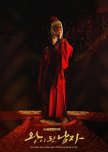
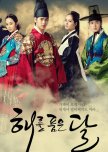


During the Joseon Dynasty, a young woman named Hong Chun Ki is a painter – a true rarity in Joseon Korea, where Confucian values dictate that such pursuits are unsuitable for a woman. She was born blind but somehow managed to acquire a sense of vision. And now she has been accepted to the most prestigious art college in the land. One day, she meets Ha Ram, an astrologer whose fate is the polar opposite of her own: Although he was born sighted, he lost his vision in a childhood accident. Regardless, he is also in possession of an astounding talent that allows him to read the future by tracing the movement of the sky at night despite the fact that he is blind. The duo is sucked into the machinations of the royal court, particularly those involving two princes, the free-spirited Prince Yang Myung and the cruel, scheming Prince Joo Hyang – a man who longs to become the next Joseon king.

Quiet and gentle, Min Jae Yi is everything a good daughter of a prominent family should be. Engaged to the son of the Second State Councillor, Jae Yi knows that the only way to bring herself and her family honor is to accept her fate, which she does with grace and charm. Devoting herself to learning everything she needs to know to become a good wife and mother, Jae Yi dutifully prepares for the future. Sadly, destiny has other plans for her future. Four days before her wedding, Jae Yi’s family is murdered. With no one else to blame for the unexpected tragedy, Jae Yi soon finds herself the object of baseless and horrifying accusations. Blamed for the death of her family, Jae Yi might not have had much of a future at all, if fate hadn’t decided to intervene. Bringing the lonely crown prince, Lee Hwan into her life at just the right moment, Jae Yi is saved from a dismal fate, but her salvation comes at a price. Plagued by a mysterious curse, Lee Hwan agrees to help Jae Yi, but only if she agrees to help him break his curse in return. Unable to refuse such an offer, Jae Yi agrees to the prince’s terms, setting them both on an unexpected path toward love. But what chance does their love have of surviving when one of them is a former murder suspect and the other is a cursed prince?

Both stories feature:
-palace intrigue
-a FL trying to help her sister
-dreams that may/may not see the future
-hidden identities
There's also a tone with both pieces--serious but not so much so there aren't moments of levity and sweet romance. (Although to be fair, the ML in Q:L&W is more romantic than the ML in LJY.)
-palace intrigue
-a FL trying to help her sister
-dreams that may/may not see the future
-hidden identities
There's also a tone with both pieces--serious but not so much so there aren't moments of levity and sweet romance. (Although to be fair, the ML in Q:L&W is more romantic than the ML in LJY.)

Both are historical dramas in which the young king falls in love with a noble girl he meets in childhood, but tragedy causes her to end up losing her family and living a commoner life, while he never forgets her and continues to search for her, finally finding her as an adult. Both dramas feature memory loss (ML vs. FL), an assassination attempt on the king in which he is initially believed dead, and scheming within the palace.

Kang Eun Bo is a woman on a mission. When her twin sister is murdered, she vows to find the killer and bring them to justice.
But during the ultra-conservative Joseon Dynasty era (1392-1910), the only woman with the power to order a manhunt for a murderer is the Queen. So Kang Eun Bo resolves to win the prized royal title so she can one day avenge her sister’s death.
To do so, however, she must first win the heart of Joseon King Lee Kyung. Lee Kyung grew up in a time of great political unrest and is less interested in matters of the heart – and more concerned with bringing peace to the realm.
Kang Eun Bo soon discovers that winning the king’s favor will not be easy; the royal court is also inundated with beautiful young women, many of whom hope to wed the king.
But when the king suddenly realizes that he recognizes Kang Eun Bo from a dream, the two begin to form an unlikely bond.
Will Kang Eun Bo ever find her twin’s killer? And could love bloom between the streetwise Kang Eun Bo and the idealistic king?
But during the ultra-conservative Joseon Dynasty era (1392-1910), the only woman with the power to order a manhunt for a murderer is the Queen. So Kang Eun Bo resolves to win the prized royal title so she can one day avenge her sister’s death.
To do so, however, she must first win the heart of Joseon King Lee Kyung. Lee Kyung grew up in a time of great political unrest and is less interested in matters of the heart – and more concerned with bringing peace to the realm.
Kang Eun Bo soon discovers that winning the king’s favor will not be easy; the royal court is also inundated with beautiful young women, many of whom hope to wed the king.
But when the king suddenly realizes that he recognizes Kang Eun Bo from a dream, the two begin to form an unlikely bond.
Will Kang Eun Bo ever find her twin’s killer? And could love bloom between the streetwise Kang Eun Bo and the idealistic king?



